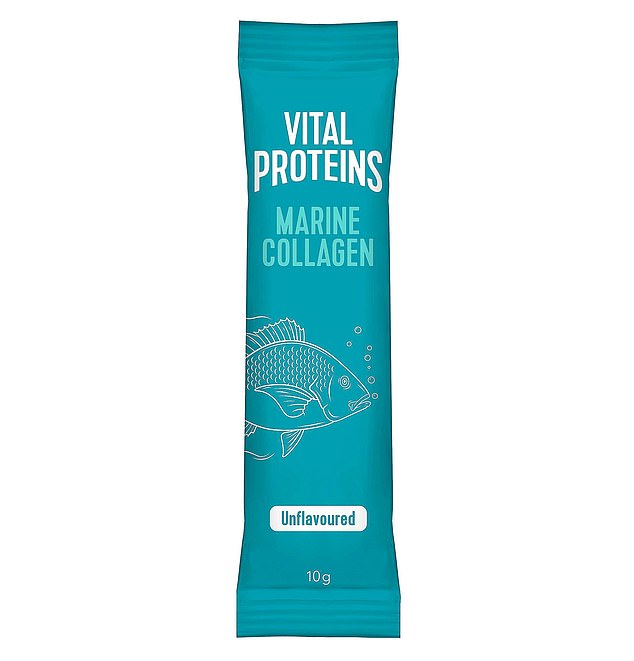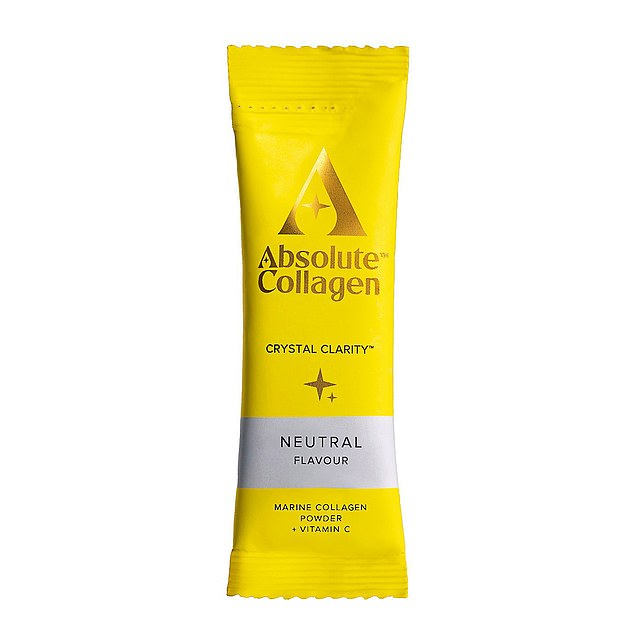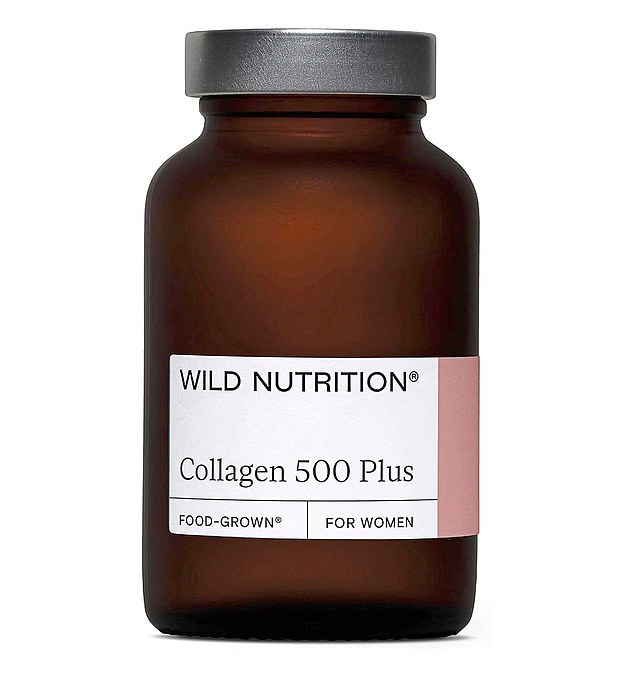Daily Mail journalists select and curate the products that feature on our site. If you make a purchase via links on this page we will earn commission – learn more
Ubiquitous supplement brands, fronted by radiant 50-something stars like Jennifer Aniston or Davina McCall, promise improved skin, hair and nails. It’s unsurprising that 15 per cent of British women have taken collagen so far this year, and the UK collagen market is set to reach £37.5 million by the end of 2025.
Yet in the notoriously unregulated world of nutritional supplements, few are as contentious as collagen. Touted by some as the secret to a glowier midlife, there are others who say it’s just one more way to fleece peri/menopausal women. Now in my mid-40s, I can see why these supplements could be a licence to print money. I’d certainly pay for something I believed might bring back my glow. But would it be worth it?
What is collagen and how does it work?
An animal-derived protein, the most common sources of collagen are bovine (cow) or marine (fish), which deliver similar benefits. It is extracted from the bones, skin or scales, then goes through a process called hydrolysis to break it down for better absorption.
‘Collagen supplements contain pre-broken protein pieces called peptides,’ explains nutritional scientist Toral Shah. ‘Your digestive system breaks them down further into amino acids, to pass through your gut wall into your bloodstream. These go to areas that require protein, such as skin, joints and bones.’ While it’s clearly not as simple as the collagen you’ve ingested going straight to smooth out your wrinkles, the peptides do act as building blocks for healthy skin. But – and it’s a decent-sized but – it may not go to your skin at all.
‘It might go to your joints, muscles or other tissues,’ says registered dietitian Nichola Ludlam-Raine. ‘You can’t “direct” collagen to your skin. The idea is to give your body the raw materials to make collagen where it’s needed.’
To me, this doesn’t feel like a bad thing. If other parts of my body need it more than my skin, I’m glad they’re getting it. But let’s consider the evidence, because some argue that too much of the research has been funded by collagen brands, making it biased. A meta-analysis (where clinical trials are pooled together for a more comprehensive result) from 2021 found that collagen ‘is effective in reducing skin ageing, as it reduces wrinkles and improves skin elasticity and hydration’, but another from 2024 found ‘studies not receiving funding from pharmaceutical companies revealed no effect for improving skin hydration, elasticity and wrinkles’.

It’s easy to be sceptical, but dismissing all evidence funded by collagen companies would mean dismissing the vast majority of it. ‘Industry-funded research is standard practice because public funding for nutritional studies is limited,’ says immunologist Dr Jenna Macciochi from the University of Sussex. ‘If we relied on government grants, we’d have little innovation or insight into food and supplement interventions. So, while it’s a valid concern, it doesn’t automatically discredit the science.’
Dr Dave Reilly, senior scientist at the brand Absolute Collagen, tells me a responsible brand will use third party testing. ‘We commissioned an independent clinical trials company to carry out a randomised, double-blind, placebo-controlled, 12-week clinical trial testing the skin and hair benefits for 130 women,’ he says. The results, which were published and peer-reviewed, showed ‘clinical benefits for skin, scalp and hair’.
Personally, I find it hard to gauge whether collagen has an effect on my skin because it differs depending on how much sleep I’ve had, how stressed I am, how I’ve been eating, and so on. But my nails definitely grew stronger when I was regularly taking collagen and became brittle after I fell out of the habit. If I can see the effect on my nails, it feels promising for what’s happening where I can’t see it.
‘Collagen isn’t just a beauty supplement,’ says Dr Macciochi. ‘It’s a structural protein used all over the body: tendons, ligaments, joints, bones, skin, gut lining. I see it as a whole-body resilience tool, useful in recovery from injury, active lifestyles and ageing well for men and women alike.’
If you’re impatient to see results, then take heed. ‘Consistency is key,’ insists Julie Lamble, nutritionist at Vital Proteins, the Aniston-endorsed brand. ‘With regular use, you’ll start to see and feel benefits in around six weeks – but the body is smart and will send the collagen where it’s most needed, so it can take time.’
How should we take it: pill, liquid or powder?
With so many products vying for our attention, how do you choose the most effective? And as a quick scan of the Holland & Barrett website shows me products ranging from £3.50 to £60, should I just opt for the most expensive to ensure the best quality?
‘The key is the dose,’ says Ludlam-Raine. ‘Powders and liquids allow you to take higher doses than tablets, simply because of volume. As for cost, a higher price tag doesn’t automatically mean better quality – look for a reputable brand that provides the collagen type and dose used in research (around 3-10g a day), with third-party testing for quality and purity.’
Lamble says the Vital Proteins dose of 10g (above, £25.76 for ten sachets) will deliver the best results, while Dr Reilly says that Absolute Collagen’s 8g (below, £55.98 for four weeks’ supply) is the most effective dose. And Gail Madalena, nutritional therapist at Wild Nutrition, says its Collagen 500 Plus is effective at just 3g (below, £35). ‘Most collagen peptides are around 2,000-3,000 dalton weight, so less efficiently absorbed,’ says Madalena. ‘Ours has a molecular weight of 500 daltons, allowing for rapid absorption, so our 3g dose can deliver powerful results.’ Wild Nutrition’s powder also contains vitamin C, biotin and silica, vital for catalysing collagen production.
So if an effective dose is anywhere between 3-10g, what’s the best way to take it? Most experts believe that pills don’t provide a large enough dose (many contain only 1g). Lamble points out that Vital Proteins powder can be added to hot or cold liquids and food because it’s tasteless and doesn’t alter the texture.
Dr Macciochi agrees. ‘Liquid collagen often includes sweeteners and preservatives,’ she explains. ‘Powders allow for effective doses without unnecessary extras.’
Dr Reilly says that powders and liquids are similar in terms of efficacy, so it comes down to preference – whatever works for you – though liquid sachets can be swallowed without being mixed into anything.
Don’t we need to eat healthily, too?
Like any supplement, collagen can’t work in a vacuum, it must be part of a skin-healthy lifestyle. ‘Eat enough protein to provide all the amino acids your body needs,’ advises Ludlam-Raine. ‘Vitamin C from fruit and veg is essential, and nuts, seeds and wholegrains provide copper and zinc to help form and stabilise collagen. Then avoid smoking and minimise alcohol, both of which break down collagen faster.’
Consultant dermatologist Dr Justine Hextall recommends adding gut-supporting foods like kefir, and skin-friendly fats such as nuts, salmon and avocado. ‘Avoid ultra-processed and sugar-rich foods,’ she says. ‘They create inflammation and promote glycation, where collagen becomes stiff and less able to renew.’ She cites evidence that antioxidants, such as lycopene in tomatoes, lutein in leafy greens and anthocyanins in berries, can protect skin against pollution and sun damage.
The right skincare helps, too. ‘Use a robust SPF and gentle products that won’t disrupt your skin barrier,’ says Dr Hextall, who recommends affordable brands like CeraVe, Cetaphil and Avène. She adds that reducing stress and prioritising sleep make a big difference, too.
So is it a miracle supplement – or a con?
If you’re expecting a magic powder to erase your wrinkles, regardless of how much wine, sun damage and junk food you subject your body to, then you may feel conned. Collagen can’t undo bad skin habits. But, while nothing is going to restore my skin to its pre-40 glory, collagen is one tool in an arsenal that includes eating more vegetables and wearing SPF. And I believe that it’s an effective one.














